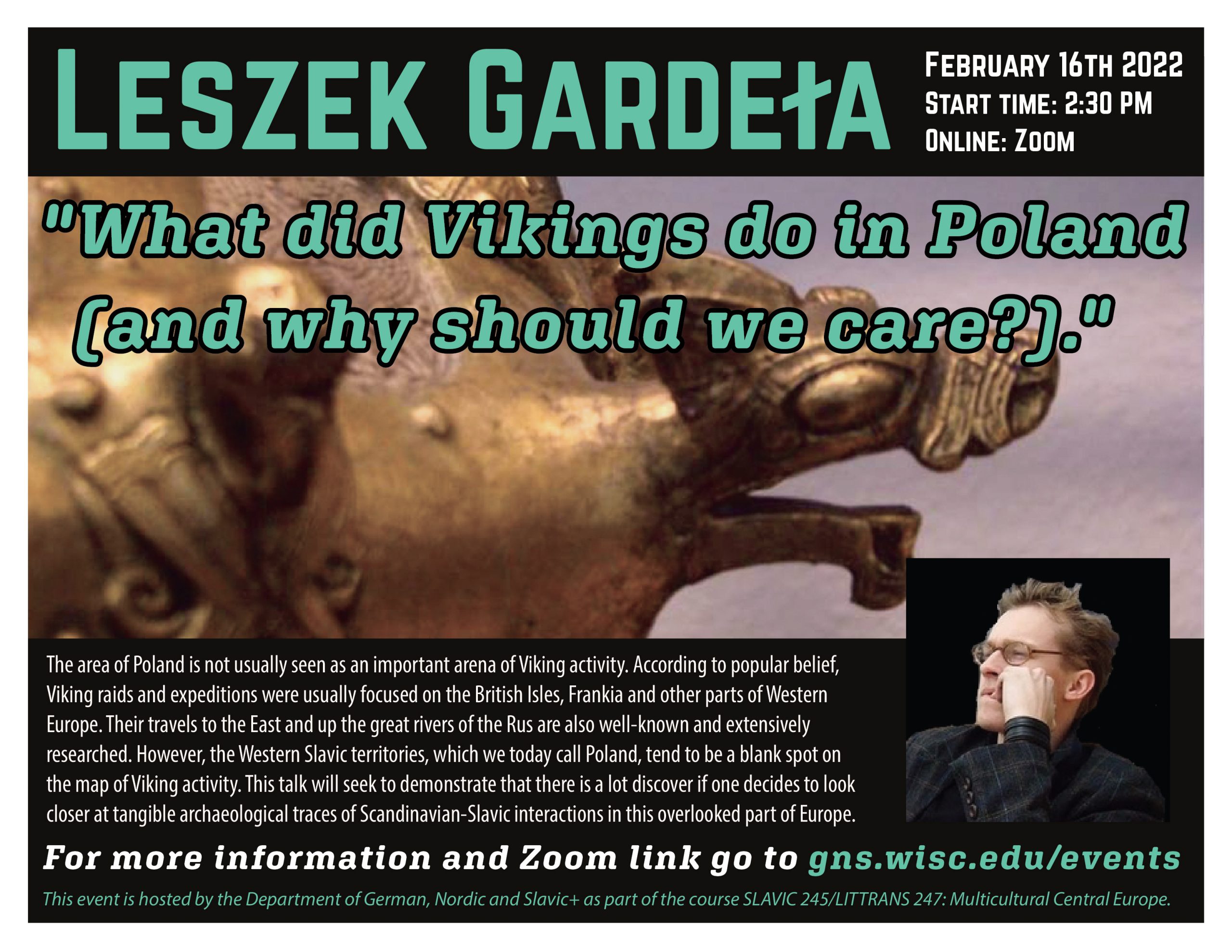
On February 16, Dr. Leszek Gardeła of the National Museum in Denmark presented a guest lecture titled “What did Vikings do in Poland (And Why Should We Care)?” via Zoom. During the online visit, Dr. Gardeła discussed notable archeological finds and hypotheses of a Viking presence in the Polish lands and answered questions from the audience in a Q&A session. The lecture, co-sponsored by the GNS+ Nordic and Slavic units, was also part of a new course this semester, Multicultural Central Europe.
Speaking to some 90 audience members directly from Copenhagen, Dr. Gardeła discussed several issues related to the interactions between Slavs and people called Vikings. These included early Viking-Slavic contacts, subsequent archeological finds, the creation of a Scandinavian myth in partitioned Poland, and contemporary fascination with Viking heritage and lifestyle. The lecture, attended by UW–Madison faculty, students, and community members, sparked a lively discussion in the Q&A part that followed.
Slavic-Scandinavian Interaction in the Baltic Region
In the lecture, Dr. Gardeła presented a broad historical view of Scandinavian-West Slavic interactions. He discussed, among other matters, the (semi-)legendary stronghold of Jómsborg, commonly associated with the island of Wolin in northwestern Poland, and the various Slavic finds there. Truso, a former medieval town in present-day northern Poland, was another locale of Slavic-Scandinavian interaction prominent in the lecture. Like Wolin, Truso was a place of intercultural trade and exchange and was most likely founded by Scandinavians, probably from present-day Denmark, the guest speaker said.
Romanticizing Northern Influence on Poland
In the second part of the lecture, Dr. Gardeła discussed the role of Romanticism in creating a myth about the Scandinavian roots of early medieval Poland. The speaker also discussed Karol Szajnocha and his idea that Vikings were responsible for establishing the early medieval Polish state. Guided by Romantic representations of the North, Szajnocha’s vision ran parallel to the views expressed by Juliusz Słowacki, the famous Polish poet, and Joachim Lelewel, a Polish historian and political activist, both of whom shared a fascination with the North. However, there is no proof that Vikings contributed to the emergence of the Polish state, the speaker concluded.
The Lutomiersk Mystery
A breakthrough came with the unearthing of the Lutomiersk cemetery in central Poland, accidentally discovered in 1940 by Jewish laborers, who were forced to work there by the Nazis. The finding of a beautifully decorated Viking sword prompted Nazi ideologists to claim that Scandinavians had in the past settled the area, which they did so to prove their claim to those areas. Subsequent excavations, however, unearthed only Slavic jewelry and pottery. After World War II, Polish archeologists re-excavated the site only to find a mix of artifacts that turned out to be of anything but local character.
Understanding Central Europe through Multiculturalism
Aside from members of the GNS+ department, the event also attracted dozens of students in a new Slavic studies course, Multicultural Central Europe, of which it was an integral part. In post-lecture reactions, students found the lecture “intriguing,” “very informative,” and that it helped them “better understand Poland’s interactions with other groups of people and their cultures.” The course, designed and taught by Dr. Krzysztof Borowski, surveys the diverse cultural history of the region through literature, history, linguistics, etc. In one of their assignments, students will collaborate on mapping projects that document multicultural sites in Poland and Central Europe.
More from the #UWPolish blog:
* * *
UW–Madison Polish Studies Program
Educating the Wisconsin public about the Polish language, literature, and culture since 1936.
The University of Wisconsin–Madison Polish Studies Program is the oldest academic program in the United States focused on the study and teaching of the Polish language, literature, and culture. UW–Madison Polish studies offer a comprehensive package of Polish language, literature, and culture courses, a generous scholarship program designed exclusively for its students, and various extracurricular activities each academic year.
The program, dating back to 1935, offers beginning, intermediate, and advanced Polish language courses, in addition to intensive Polish courses for heritage speakers and (under)graduate students. In 2011, the program received the prestigious Polonicum Award Distinction from the University of Warsaw for its achievements in promoting the Polish language and knowledge about Polish culture and history. The UW–Madison Polish program also offers a broad range of Polish culture courses on Polish film, contemporary Polish culture, Polish migration to the Americas, a survey of Polish culture from the Middle Ages to modern times, Polish comedy culture, and post-communism.
Each year, the UW Polish program awards scholarships for tuition through the Lapinski fund to undergraduate and graduate students studying the Polish language, literature, and culture. The Polish Student Association (PSA) provides a space for all students interested in events, activities, and learning about Poland and Polish culture. In collaboration with the Polish program faculty, the PSA also co-organizes the Madison Polish Film Festival, an annual celebration of Polish cinematography in Madison, Wisconsin, now in its 31st edition.